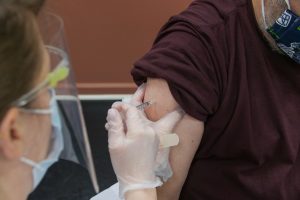Herman Byrd’s prostate cancer diagnosis hit him hard. With Medicare paying for his radiation treatments, he lost over 20 pounds on his slight frame- and all hope.
After 39 treatments, he was at risk for placement in a nursing home. He was depressed. He refused to go to a nursing home where he said he watched his two sisters deteriorate while uncaring nurses left them soiled in their beds for hours.
Byrd was among hundreds of people rallying at the Statehouse last month on behalf of supplemental funding for social services, specifically for at-home care for the elderly and persons with disabilities.
The rally in Springfield was one of several held throughout the Midwest last week to bring attention to the March 1 deadline when healthcare cuts went into effect.
Byrd and other protestors gathered at the state capitol to call out U.S. Sen. Mark Kirk (R-Ill.) for voting in favor of healthcare cuts and voting against supplemental funding for in-home care.
Kirk’s office did not respond to questions about providing funding for in-home care.
The state provides funding for in-home care for the elderly through the Community Care Program. The state introduced increased funding for this program from $678.4 million in FY2012 to $774.5 million in FY2013, according to a report from the Illinois Department on Aging.Gov. Pat Quinn announced the FY2014 budget in his address Wednesday that included increased funding to the Community Care Program: $173 million.
According to the department’s report, in FY2012 there was a deficit of just over $100 million to the Community Care Program. There will be an estimated 10,400 people served under the program in FY2014. So despite the proposed increase of funding, there will be a greater shortfall of nearly $150 million.
“Every single year, we fight the same fight,” said Ashunda Harris, spokeswoman and an organizer for Service Employees Illinois Union Healthcare.
One state representative said she’s worried about more cuts to social services when programs continue to be underfunded.
“[Underfunded social services] have caused sick people to become sicker and forced people to travel farther to receive proper care,” said Rep. Mary E. Flowers (D- Chicago), chairwoman of the Healthcare Availability Access Committee, adding that in-home care would eliminate this problem.
Flowers has worked for 30 years to increase access and availability of healthcare for all Illinois residents, but federal cuts and opposition from state legislators has limited what can be done, she said.
When asked about specific bills that would increase funding to social services, state Rep. Greg Harris (D-Chicago), chairman of the Appropriations- Human Services Committee, could not mention any that he was specifically aware of, but said negotiations with advocacy groups, including Service Employees Illinois Union Healthcare, continue.
Ashley Crump, a Chicago mother of two and a personal assistant who provides in-home care to the elderly with Help At Home, Inc., fears that funding cuts could cause her to lose her job.
“There are lots of elderly people who need our help- we need to keep them at home where they can get good care,” Crump said.
As for Byrd, he is doing much better with the help of his in-home personal assistant Annette Jones, who comes to his house at least twice a week to make sure he is taking his medicine and taking care of himself.
With her encouragement and help, he’s been able to continue to fight the cancer.
“She [Jones] saved me- she cared for me when I thought no one did.”














Be First to Comment